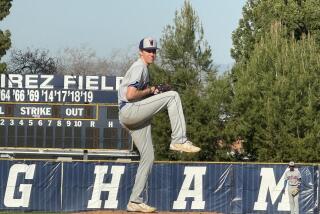The Boys of the Summer of ’42 : An American Legion Team From Los Angeles, Led by a Crusty Fireplug of a Manager, Embarked on a Whistle-Stop Tour of War-Time America That Ended in a National Title. Thirteen of the 15 Players, Including the Venerable Gene Mauch, Went on to Pro Baseball Careers.
- Share via
Ralph Atkins remembers the summer of ’42.
It was the summer when he, 14 other teen-agers and a stubby, terse coach from Los Angeles ripped through the world of amateur baseball.
Atkins, 67, of Long Beach was the first baseman for the American Legion team representing Sunrise Post 357 in Los Angeles, which won the 1942 national Legion championship, compiling a 25-2 record in the playoffs.
What is equally impressive, though, is what those players did next. Of the 15, 13 went on to play professional baseball, including major leaguers Gene Mauch and Nippy Jones.
Along the way to the championship, the Sunrise team played a team representing San Diego Post 6, which included Bob Usher, who played six seasons in the majors. Sunrise also played a team representing Stockham Post in St. Louis that included Yogi Berra.
Sunrise beat them all.
The 1941-42 school year at Fremont High School, where 13 of the Sunrise players were enrolled, took a turn for the worse in early 1942. The United States had entered World War II in December, 1941, and the war effort was not going well in the opening months. The boys at the school began to suspect it was only a matter of time before classes, girls and sports were replaced among their priorities by grenades, rifles and bombers.
But with all that to consider, 15 boys still managed to keep their minds on baseball, thanks in large part to Mike Catron, the Sunrise coach.
“Mike was about 5-feet-4 tall and 5-4 wide,” said outfielder John Bebek, 66, who lives in Irvine. “He was a good coach. During infield, he would hit a fungo that would make your hands bleed. After practice, about 12 of us would try to take him to the ground and he would whip every one of us.”
If players missed ground balls during infield practice, Catron would hit them harder. Then harder again. And harder still “until you were ready to go fight him,” Atkins said. “But you knew he was doing it for your own good.”
Catron, who later served as a scout for the Cleveland Indians, was a strong believer in hard work and fundamentals. Several of the players attributed their ascension to professional baseball to Catron.
“He knew more baseball than anyone I’ve ever played for,” said second baseman Don Runcie, 66, of Mission Viejo. “If you’d go out in the outfield during batting practice and you’d be standing around talking, he’d yell, ‘Hey, break up that tea party! You’re not out here to talk!’ ”
Said Mauch, 66, of Rancho Mirage: “Mike was a rough, crusty little fella who really was made out of Jell-O. He loved us all like sons, but he treated us just like stepkids. But he loved us and we knew it.
“I think he was smart enough to know that he had something special on his hands, and as long as he kept us in tow we were going to win. That was quite an array of 16-year-old ballplayers.”
There is no question the Sunrise players were good, and they knew it. Most of them came from a program at Fremont where winning was the norm. And Fremont long has been a producer of major league players, ranging from Bobby Doerr to Eric Davis.
“We were a cocky bunch of ballplayers,” said Mauch, who played primarily third base and catcher for Sunrise. “We started every game saying we were five runs behind. That’s the way we played.”
They also had most of the players returning from the 1941 team that had lost the Southern California championship to San Diego Post 6, which went on to win the national title. That 1941 defeat did not sit well with the Sunrise players.
“We had it stolen away from us in 1941,” Mauch said. “It was the worst umpiring I ever saw in my life. We were up by one run and Bill Spaeter threw pitch after pitch right down the middle of the plate, but the ump kept calling them balls and the tying run and winning run walked in.”
Sunrise had trouble with San Diego again in 1942, losing the first game of the best-of-three series, 10-6. It was the team’s first defeat that season. Sunrise then won the next two, 9-5 and 19-5.
Having won the Southern California championship, Sunrise hit the road. The team’s path to the national championship took it through Stockton, Miles City, Mont., and Hastings, Neb., before reaching the “Little World Series,” as it was called, in Manchester, N.H.
In 1942, travel like that meant spending time on trains. A lot of time.
“It was an unbelievably good time,” Mauch said. “I wish I were poetic. I could really tell you some stuff.”
As you might expect with a bunch of teen-agers, most of whom had never been out of California, strange things happened.
At one stop, Mauch got off the train to mail a letter, and the train left sooner than he expected and he had to run to get it to stop.
On the train, Jim Muhe, an outfielder who served as the visitors’ clubhouse attendant for the Dodgers from 1960 through 1990, had a lower bunk. Mauch had the upper.
“So when everyone thought Mauch had been left at the station, Muhe popped up with, ‘Can I have his bunk?’ ” said ace pitcher Dan Brown, 67, of Sepulveda.
Brown tells another story about a hot summer day when the train broke down somewhere in Montana.
“(Catcher Dick) Kinaman was throwing water on Atkins, then he missed him and got it all over a full-fledged Navy officer,” Brown said. “Then (the officer) got it again from a few other guys. He was not happy.”
On the field, the Sunrise players had little trouble until they got to Hastings, where they played St. Louis Stockham for the to determine the western championship. Stockham was a powerhouse too. Besides Berra, the team had a young pitcher named Roy Sievers, who would go on to hit 318 home runs in 17 major league seasons.
But Stockham had not even brought Sievers to Hastings because he was too young, Berra said years later. Berra also said that might have been a mistake.
The series began with Sunrise winning the first game, 8-0, on a Saturday. But Stockham won the second game, 8-4, on Sunday. Berra, not known for his speed in his 19-year major league career, stole home in that game. The decisive game was played later that day.
Brown, who pitched the first game, came back to pitch again in Game 3. Stockham scored four runs in the top of the first inning, including a home run by Russ Steger that Brown remembers going “about 400 country miles.”
Years later, Steger did more damage to another Southern California team. As a three-time All-American in football at Illinois, he returned an interception 54 yards, helping the Illini beat UCLA in the 1947 Rose Bowl.
Back in Hastings, though, Sunrise came back with four runs in the bottom of the first, then broke open a 6-6 tie with seven runs in the bottom of the eighth, sending the team into the championship series.
At the Little World Series, Sunrise swept Manchester, N.H., the host team, in three straight. Brown pitched and won the first game, 6-2. That game was called in the seventh inning when thick fog rolled over the field.
“You couldn’t even see the outfield,” Brown said.
Sunrise won the second game, 5-2, and the clincher, 3-0.
Catron made sure the players appreciated what they had done at the time, Atkins recalled.
“He said, ‘Some of you guys are going to be playing pro ball, but you better enjoy this because this beats pro ball. That’s a business, but you can really enjoy this.’ And he was right.”
The Sunrise players’ reward for winning the championship was a few more days on a train--to see the first two games of the real World Series in St. Louis--courtesy of the legion post.
Back at Fremont, they returned to other sports--football, basketball and track. Brown, the myth goes, once won the long jump at a track meet between innings of a baseball game he was pitching.
“That never happened,” Brown said. “Sounds good, though.”
After graduation, most of the players went into the service.
They returned to their baseball careers after the war. Most played a few years in the minor leagues, then decided, as Brown said, “it was time to find a job.” Others had varying success.
Atkins’ 11 years in the minors included five seasons in the now-defunct double-A Southern Assn. He holds that league’s home run record with 142.
Kinaman, who was MVP of the series in Miles City, also played 11 seasons in the minors, then managed for five in the Red Sox, Angel and White Sox systems.
Jones, 67, who lives in Sacramento, played for the St. Louis Cardinals, Philadelphia Phillies and Milwaukee Braves during eight major league seasons. He is best remembered for an incident in the 1957 World Series between the Braves and Yankees.
In the 10th inning of Game 4, a low pitch by Yankee pitcher Tommy Byrne to Jones was called a ball. Jones said the ball had hit him, then ran back to the screen to retrieve it. He showed the umpire a shoe-polish mark on the ball, proving his point. The ump agreed and sent Jones to first base. Many have said that play turned the tide in the Series, which the Braves won in seven games.
Mauch became the most successful of the 1942 Sunrise players. He spent nine seasons in the majors with the Brooklyn Dodgers, Pittsburgh Pirates, Chicago Cubs, Boston Braves, St. Louis Cardinals and Boston Red Sox before serving 26 seasons as a manager. He finished his career with the Angels in 1987.
There were clues even 50 years ago that Mauch was destined to run a team.
“He was always ahead of everybody upstairs,” Brown said, referring to Mauch’s baseball intellect. “He pulled a lot things that 15-16-year-old kids don’t think about. He was playing center field once and there was a runner on second, when a grounder was hit up the middle. Mauch fielded the ball, but he faked that it got through him. Then the baserunner took off for home and Mauch threw him out.”
Brown also said that Mauch, when playing shortstop, would step into the base line for a split-second--just long enough to make the runner hesitate to avoid a collision but not long enough to be called for obstruction--and prevent runners from going to third base.
“He used to do things like that all the time,” Brown said. “He told me one time he did that to Duke Snider.”
Kinaman, who was one of Mauch’s closest friends, said the two of them used to skip school.
“We would go to the beach and all we would do is talk about baseball,” Kinaman said. “Gene Mauch was intelligent and we all felt that he would become a big league player.”
Mauch wasn’t thinking that far ahead.
“I was thinking about how good a player Nip Jones was, how good a player Ralph Atkins was, how good a player I was,” he said. “They were a special bunch of people. I’ll remember them forever.”
More to Read
Go beyond the scoreboard
Get the latest on L.A.'s teams in the daily Sports Report newsletter.
You may occasionally receive promotional content from the Los Angeles Times.










